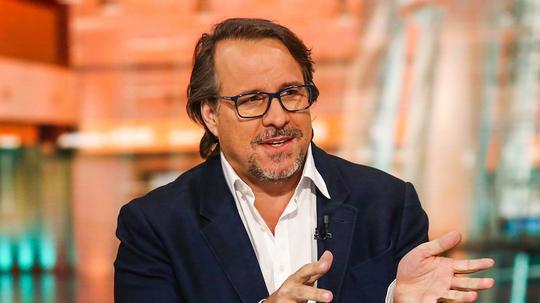
When news broke on Monday that Michael Ferro was retiring as the chairman of Tronc, confusion swept through Chicago’s media industry.
But only hours after Ferro’s retirement announcement, a Fortune story was published that may help explain what accounted for his abrupt departure from the media company. The story revealed two women’s accounts of inappropriate sexual advances allegedly committed by Ferro, who is also a tech entrepreneur and investor in Chicago, highlighting the first public example of the #MeToo movement extending to the city's tech and startup scene.
The #MeToo movement started last year after several high-profile men, including Harvey Weinstein, Charlie Rose and Matt Lauer, were accused of sexual harassment. The accusations have extended to men across industries, but the latest ones against Ferro have put Chicago's tech scene in the middle of a national discussion on sexual harassment and abuse of power.
"We're not immune to the behaviors that we've been seeing coming out of the coasts," said Julia Kanouse, the CEO of the Illinois Technology Association. "My hope is that the Michael Ferro case is an anomaly for our region, but at the same time, I hope that [our] leaders are taking the time to look at it and figure out what they can do better and differently to ensure that it is just an anomaly."
According to the Fortune story, the women were allegedly violated by Ferro during secluded evening business meetings. Both Kathryn Minshew, the founder and CEO of The Muse, and Hagan Kappler, the vice president of corporate development at Ingersoll Rand, say they experienced inappropriate and unwanted sexual advances from Ferro during these meetings in which he attempted to kiss and grope them.
"I find it deeply disconcerting that there has been ... literally no response from Chicago’s entrepreneurial leaders on this issue."
Chicago Inno reached out to Ferro’s representatives for comment but they did not respond to requests as of press time. A Ferro spokesman gave a statement to Fortune on Monday that read, in part: "Over more than 20 years of leading public companies and other enterprises, Michael Ferro has never had a claim filed against him nor a settlement made on his behalf. Your on-the-record allegations appear to involve private conduct with private individuals who were not employees of tronc or any other company he ran."
Ferro has been very active in Chicago’s tech and startup scene, becoming somewhat of a serial entrepreneur. He founded Click Commerce in Chicago in 1996, which sold 10 years later for $292 million to Illinois Tool Works. In 2015, he sold his second Chicago-built company Merge Healthcare to IBM for $1 billion. He then used his wealth to back a number of Chicago businesses and startups, which eventually led to him purchasing stake in the Tribune Company and renaming it Tronc.
Ferro was previously on the board of the Chicagoland Entrepreneurial Center, which owns 1871. In the past, the CEC gave Ferro the Entrepreneurial Champion Award for his contributions to the Chicago’s tech ecosystem. He retired from the CEC's board several years ago and 1871 representatives told Chicago Inno that they have no current involvement with Ferro.
According to their websites, Ferro still sits on the boards of the city’s Field Museum and the Museum of Science + Industry. The Ann & Robert H. Lurie Children's Hospital of Chicago still lists Ferro on their website as a campaign donor.
Local investor Ezra Galston wrote on Tuesday in a series of tweets that organizations should distance themselves from Ferro.
2/ The directors of @1871Chicago, @NorthwesternU, @FieldMuseum @LurieChildrens and more should immediately remove him from their boards and return his money. This is an individual who has brazenly hurt women’s lives. But ppl are scared.
— Ezra Galston (@EzraMoGee) March 20, 2018
“I find it deeply disconcerting that there has been not only an immaterial response, but literally no response from Chicago’s entrepreneurial leaders on this issue,” said Galston in an interview with Chicago Inno. “My concern with organizations not distancing themselves from Michael Ferro is that it sends a message of intolerance and lack of inclusion. It sends a message that predators will be supported. It sends a message that money is more important than integrity, and that power is more important than integrity.”
The Ferro case has helped highlight the common obstacles women startup founders face when working in tech, and particularly when they are exploring venture capital funding avenues. Often times, deals are made during evening dinners and drinks—at social events, not during business hours. And a lot of times women aren’t invited to these events, and if they are, it exposes them to possible uncomfortable or inappropriate interactions.
Kanouse said that much of the reason why women startup founders receive venture capital funding at lower rates than their male counterparts is because of the circumstances under which deal-making is done.
"It's definitely been for many years a boy's club," Kanouse said. "I think there's women who see hope and opportunity, but there's also women that have had experienced ... bro culture and that lack of inclusiveness. The where, the why and the how is not an inclusive environment for women. And because it's been a boy's club, there aren't enough women that are part of that conversation and that are part of the decision making in terms of who gets funded."
Nicole Yeary, the founder and CEO of Ms. Tech, a Chicago-based organization that provides resources and community for women in tech, said this is one of the reasons why there needs to be more female early-stage investors.
Ms. Tech has more than 4,000 global members, and is currently planning a number of events that aim to create safe spaces for women in tech to discuss their experiences with discrimination and sexual harassment.
“When one person is vulnerable, it gives other people permission to be vulnerable,” Yeary said. “That type of vulnerability and that type of permission allows an entire community to build a stronger relationship, to move the entire community forward and change the landscape dramatically for women in technology and business.”
Editor's note: This story has been updated to read that 1871 has no current involvement with Michael Ferro. The story originally said 1871 would have no future involvement with him.








